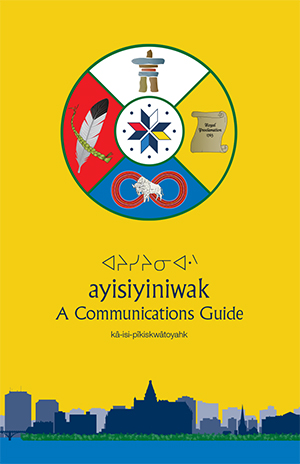Truth and Reconciliation
- Truth and Reconciliation Commission of Canada: Calls to Action
- Educational resources from the National Centre for Truth and Reconciliation
- Summary of the TRC's final report: Honouring the Truth, Reconciling for the Future
- Principles of truth and reconciliation: What We Have Learned
- The Survivors Speak
- Final report, volume 1, part 1: Canada's Residential Schools: The History, Origins to 1939
- Final report, volume 1, part 2: Canada's Residential Schools: The History, 1939 to 2000
- Final report, volume 2: Canada's Residential Schools: The Inuit and Northern Experience
- Final report, volume 3: Canada's Residential Schools: The Métis Experience
- Final report, volume 4: Canada's Residential Schools: Missing Children and Unmarked Burials
- Final report, volume 5: Canada's Residential Schools: The Legacy
- Final report, volume 6: Canada's Residential Schools: Reconciliation
USask Indigenous Research Workshop Series
2021
Resources
- Universities Canada's 13 principles on Indigenous education
- SSHRC report: Opportunities in Aboriginal Research
- SSHRC guidelines: Guidelines for the Merit Review of Aboriginal Research
- Universities Canada - Resources from International Organizations
- The Canadian Encyclopedia
- Please note: This site does not recognize the history before newcomer arrival.
-
Indigenous Peoples | The Canadian Encyclopedia
August 17, 1956. Reconciliation . Forced Relocation of the Sayisi Dene. Concerned that the Sayisi Dene were overhunting caribou around Little Duck Lake in northern Manitoba, the Province successfully petitioned the federal government to relocate the Dene community to the outskirts of Churchill.Despite government promises, the 250 displaced people were left destitute, lacking food, shelter and ...
www.thecanadianencyclopedia.ca
The beginning of Métis history is hard to determine. However, Métis ethnogenesis, or self-identity, emerged in the mid-1750s in the Great Lakes region, as Canadien -Algonquian mixed-bloods recognized their distinctness and sought each other for marriage/trading alliances. Later, this self-awareness crystallized in the Red River when the Métis challenged the Hudson’s Bay Company’s (HBC) attempts to curb their lifestyle as fur trade provisioners and free traders. It was there, on June 19, 1816, that the Métis or Bois-Brûlés led by Cuthbert Grant defeated a party of HBC men and Selkirk Settlers at Seven Oaks. This self-identity further blossomed after the 1821 North West Company-HBC merger, when hundreds of Métis or gens de libre circumvented the HBC’s fur trade monopoly in the 1830s–40s, fought the Dakota for access to the rich bison-hunting grounds of the Dakotas in the 1840s–50s, and resisted the Canadian state from 1869 to 1885.
Iconic Red River cart - Article
Partnerships
- Métis Governance and Policy: Chair Dr. Kurtis Boyer
- Gabriel Dumont Research Chair in Métis Studies: Chair Dr. Allyson Stevenson
Aboriginal Research Resources
Aboriginal Research Resources brings together interdisciplinary sources and information relating to Indigenous studies and Indigenous histories.
Indigenous Studies Portal
The Indigenous Studies Portal (iPortal) connects faculty, students, researchers and members of the community with electronic resources: books, articles, theses, documents, photographs, archival resources, maps, etc. iPortal provides one place to look to find resources for Indigenous studies.
National Centre for Truth and Reconciliation Archives
Access the five million electronic statements, documents and other materials collected by the Truth and Reconciliation Commission throughout the course of its work.
Virtual Museum of Métis History and Culture
This website is the most comprehensive attempt to chronicle traditional Métis history and culture on the web and contains a wealth of primary documents—oral history interviews, photographs and various archival documents—in visual, audio and video files.
University of Saskatchewan Archives
The University of Saskatchewan Archives, in collaboration with other publically-accessible archives in the province, have a special section of material relating to First Nations, Métis and Inuit peoples.
Shekon Neechie.ca
A venue for Indigenous historians to gather as a e-community and share their ideas or works in progress. Includes photographs, videos, podcasts or through other means, and whose work is based in oral history and traditions, archival research, archaelology and material interpretation.
Indigenous Saskatchewan Encyclopedia
In 2005 the Canadian Plains Research Centre, University of Regina Press created the single, largest, educational publishing project in Saskatchewan's history, the Encyclopedia of Saskatchewan, to celebrate Saskatchewan’s centennial anniversary. The encyclopedia was publicly available online until mid-2018. Within this encyclopedia were a significant number of resources that documented Saskatchewan’s numerous Indigenous Peoples’ histories, significant figures and events. With permission from the University of Regina Press, the GMCTL and Indigenous Voices offer these resources on our website as they were originally published
Saskatchewan Indigenous Encyclopedia
Office of the Treaty Commissioner
- The Office of the Treaty Commissioner in Saskatchewan promotes respect and understanding of Treaties and helps support the Treaty parties in maintaining and enhancing the Treaty relationship through dialogue, neutral support, assistance with resolving disputes and commitment to the Treaty principles.
- Treaty Timeline
- Maps
- First Nations Historical Worldview
City of Saskatoon, SICC and OTC


